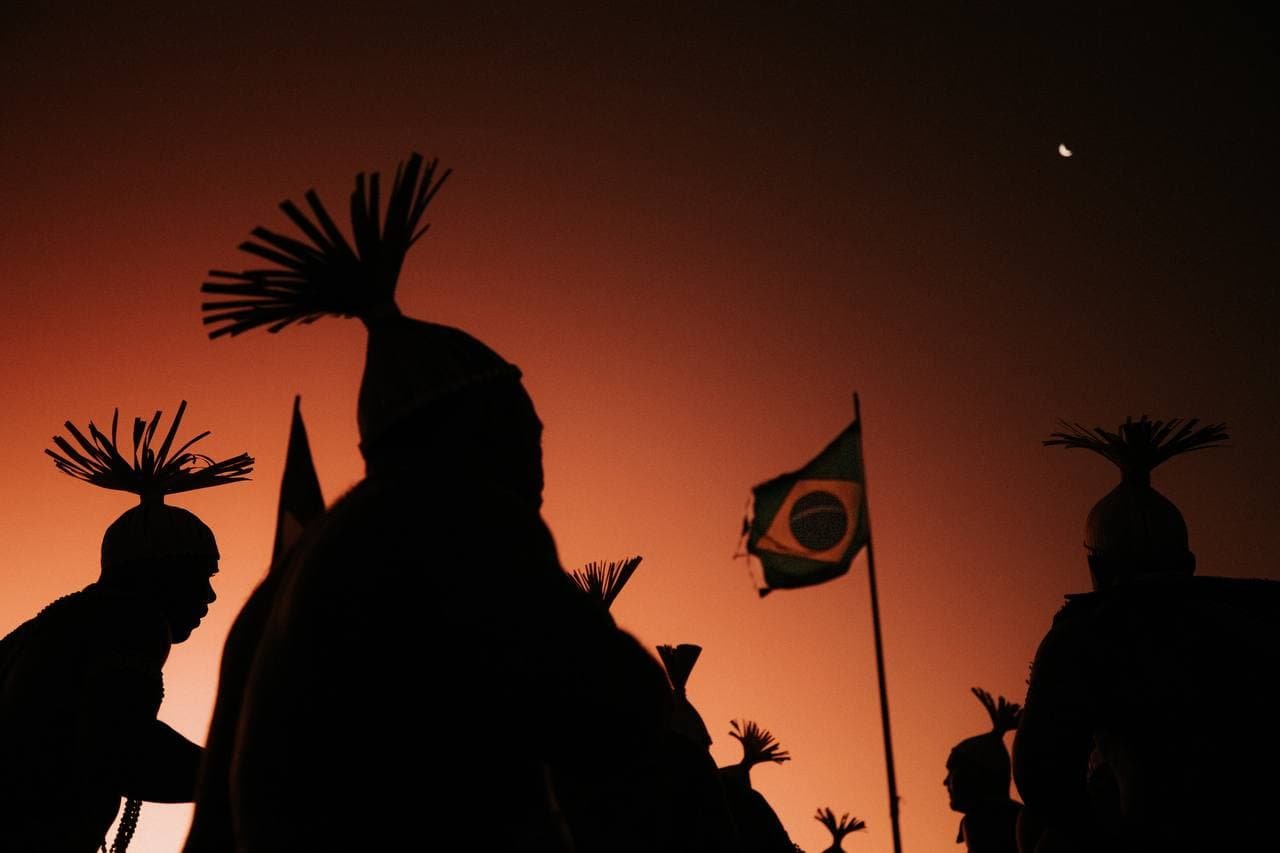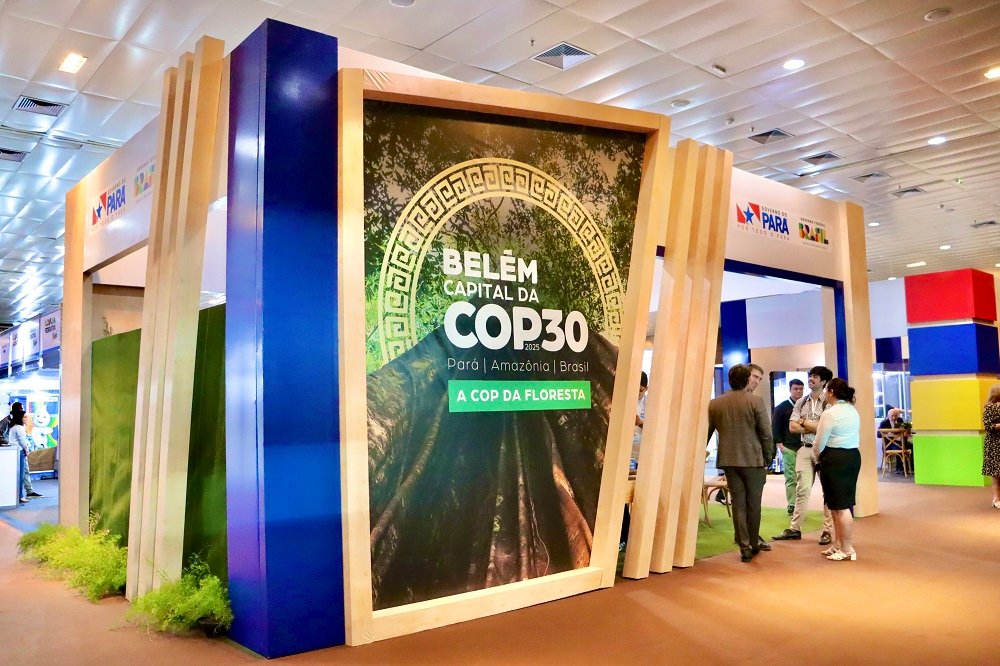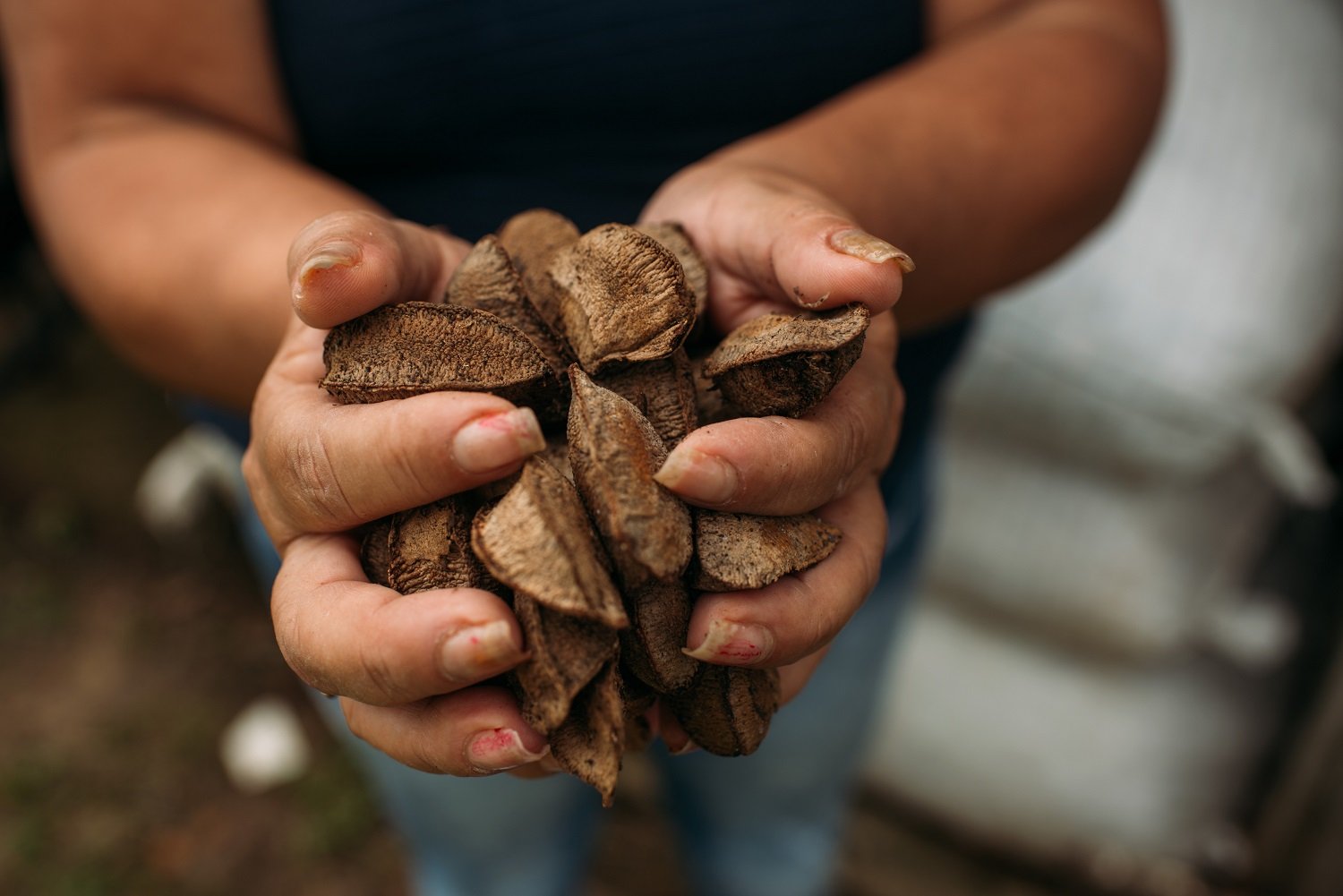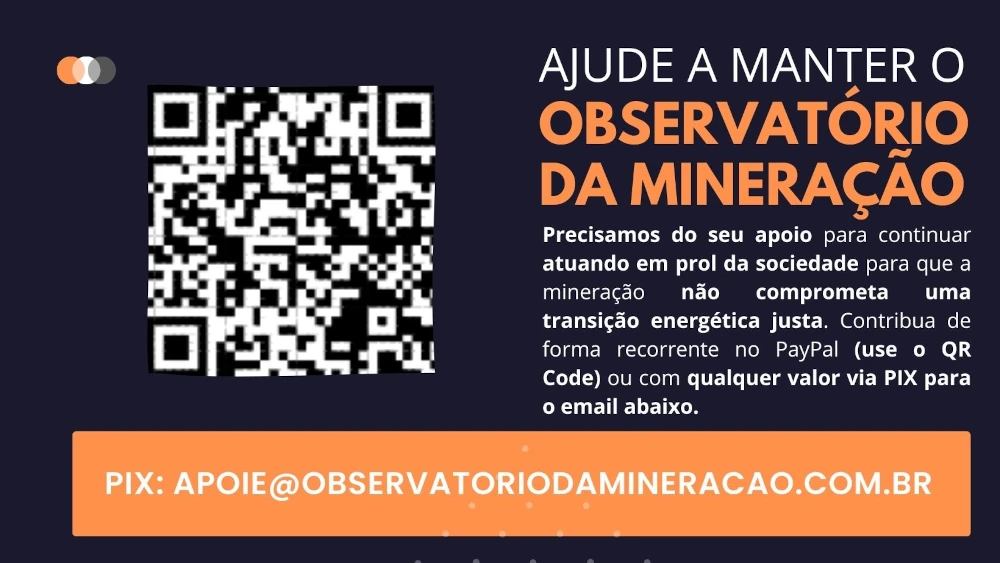Story by Lucio Lambranho
Translated by Gabriela Sarmet
Editing: Maurício Angelo
In addition to a series of measures to try to reduce the rights of indigenous peoples within the debate on the Marco Temporal guided by agribusiness and mining, the bill proposal presented last Friday (14) by Supreme Court Justice Gilmar Mendes uses the argument of ‘relevant public interest’ to justify allowing mining on indigenous lands and eliminates the need for prior consent from indigenous communities in all cases.
According to the proposal, the use of areas that have been demarcated or are still in the process of being demarcated can, among other interests of the Union, be used for the ‘exploitation of strategic mineral resources’. This broad list of minerals was defined by decree and resolution in 2021 and includes everything from iron ore, the main product of the Brazilian mineral industry, to substances such as copper, niobium, nickel, rare earths and others, used massively in renewable energies and electric cars.
In other words, it is the energy transition argument that is being used as the main vector of the ‘public interest’ that could open up indigenous lands to industrial mining, an agenda that has been running through Congress since the 1990s in different bills, the latest being PL 191/2020, authored by Jair Bolsonaro, Bento Albuquerque and Sérgio Moro, which was only put on hold for good in 2023 after indigenous demonstrations and the defeat of the far-right project in the elections.
The referral of the negotiating table brings back the same arguments used by the Bolsonaro government with the creation of the Pro-Strategic Minerals Policy, signed in 2021. This is mentioned in article 21 of the bill proposal, which has been rejected by the main indigenous organisations and by experts who study the issue.
This is what is argued in an analysis by researchers from UFPA, UFJF and UFF, who make a comparison between the proposed text, which could serve as the basis for a bill in the National Congress, and the 2021 decree.
The aforementioned article 21 establishes, for example, a series of activities that could be used by the Ministry of Justice to interrupt the demarcation process. In other words, say the experts, if there is an attempt to demarcate an area where there are requests for mineral research or mining, it could be denied based on the argument that the exploitation of mineral resources would be a priority.
‘This prioritisation is unconstitutional, given the original nature of the indigenous right to traditional land,’ say Ana Alfinito, researcher at the Amazon Institute for Family Farming at the Federal University of Pará (INEAF/UFPA), Bruno Milanez and Luiz Jardim Wanderley, both from the Politics, Economics, Mining, Environment and Society research group at the Federal University of Juiz de Fora (Poemas/UFJF). For the researchers, ‘mining interests are repeatedly prioritised over indigenous territorial rights despite the latter’s original and constitutional status; the “national interest” is repeatedly used to allow the restriction of indigenous rights, which can lead to the legitimisation of the non-recognition of traditional lands and the opening up of demarcated Indigenous Lands to activities with a high socio-environmental impact’.
As shown in the report ‘Pure Dynamite: How the Bolsonaro government’s mineral policy (2019-2022) set up a climate and anti-indigenous bomb’, released at the end of March 2023 by the Mining Observatory and Sinal de Fumaça, the 2021 decree also instituted the creation of the Interministerial Committee for the Analysis of Strategic Mineral Projects (CTAPME), which would analyse the projects presented by mining companies and provide support for environmental licensing processes.
Besides illegal mining, which for many decades has been responsible for countless crimes inside indigenous lands, the opening up to large-scale mining could definitively jeopardise the role of environmental and climate safeguards that Indigenous Lands play, according to several scientific studies.
The Pro-Strategic Minerals policy adopted by the Bolsonaro government has allowed big mining corporations to speed up the licensing of projects to extract minerals, even with impacts on the environment and indigenous peoples.
‘The use of the term ‘strategic minerals’ in this case serves to create a false sense of priority since Resolution 02/2021 of the Interministerial Committee for Analysing Strategic Minerals Projects establishes very broad criteria for defining what strategic minerals are,’ the researchers point out. The Committee does not include the participation of the Ministry of Indigenous Peoples, the Ministry of Justice or the Ministry of the Environment.
The aim of standardising the rules for mineral exploration on indigenous land, depending on what is decided by the National Congress, which is largely dominated by ruralists and allies of mining companies, has long been used to bypass the rights of indigenous peoples.
The 1988 Constitution ‘recognises in article 231 the right of indigenous peoples to the lands they traditionally occupy. It contains a word that is significant: the rights of indigenous peoples are original. In other words, these rights precede the constitutional legal order itself,’ said lawyer Bruno Moraes, substitute professor at the Federal University of Pará (UFPA), in an interview with the Observatory for the 2022 special report.
Featured photo: Free Land Camp 2022/APIB
Supreme Court negotiating table was controlled by interests opposed to indigenous peoples and court’s impartiality is questioned
Maurício Terena, lawyer with the Articulation of Indigenous Peoples (APIB) and the Terena People’s Council, believes that the Supreme Court (STF) could lose its legitimacy to judge cases involving indigenous rights after the presentation of this bill. According to Terena, ever since the debate began in the Supreme Court, the organisation had already pointed out that there were behaviours adopted by the judge rapporteur that ‘run away from a reasonable, predictable procedural logic, within the legal framework provided for by the Code of Civil Procedure and the Constitution’.
APIB, Terena recalls, has been ‘systematically aggravating the judicial decisions issued by Minister Gilmar Mendes and, to date, none of these appeals have been analysed by him’.
‘It is with great concern that we realise that this Conciliation Chamber is coming to an end with leniency on the part of Justice Gilmar Mendes’ colleagues, since the Minister with jurisdiction to judge the Marco Temporal issue in the Supreme Court is Justice Edson Fachin, and Justice Luiz Roberto Barroso himself did not hear the case brought by APIB,’ Terena explains.
For APIB’s lawyer, although it is “shocking and outrageous” for the minister to put forward a proposal that is “even worse than Law 14.701 (which seeks to establish the Marco Temporal / Timeframe Thesis for land demarcations),” it feels like an all-out assault on Indigenous rights.
‘We are dealing with the Supreme Court, and this is behaviour that is expected, for example, within the National Congress, to pass a bill on the sly, through legislative manoeuvres by the president of the house. This is very common and we saw it a lot during Arthur Lira’s presidency. But now, within the Supreme Court, we see it above all as an attack on the Federal Constitution. It’s the maximum expression of coloniality, of all the violence that took place during this nefarious period against indigenous peoples, and it’s materialised very clearly in this process,’ Terena argues.
In the final stages of the round table set up at the Supreme Court to discuss the issue, it came as a surprise that indigenous deputy Célia Xakriabá (PSOL-MG) was replaced by Bolsonaro’s supporter Silvia Waiãpi (PL-AP), whose legitimacy is questioned even by her own people in Amapá, who participated in an openly anti-indigenous government and had her deputy’s mandate revoked until the final decision for using public funds for facial harmonisation.
For Maurício Guetta, Deputy Coordinator for Politics and Law at the Socio-Environmental Institute (ISA), Mendes’ bill proposal could put an end to the STF’s exemption to analyse the issue.
‘The STF’s presentation of a legislative proposal for a general review of indigenous peoples’ rights is absurd. If it does so, it will compromise its main function, that of analysing the constitutionality of laws and guaranteeing the protection of fundamental rights. Its role could never be to offer draft legislation and negotiate indigenous peoples’ rights. The question remains: is the STF willing to be the initiating body for what could become the approval of the biggest setback in the rights of indigenous peoples since the 1988 Federal Constitution?’ Guetta asks.
Coordinator of the Remote Sensing Centre at the Federal University of Minas Gerais (UFMG), cartography professor Britaldo Soares-Filho argues that the negative impacts of mining on indigenous lands should be considered.
Soares Filho is one of the authors of the study that analysed the impacts of Bill 191/2020, which attempted to open up indigenous lands to mining under the Bolsonaro government.
The conclusion of the study published in the scientific journal One Earth was that there would be a loss of US$ 5 billion a year in ecosystem services, considering only the production of food such as Brazil nuts, the sustainable extraction of timber and rubber, the mitigation of greenhouse gases and climate regulation. In addition, there would be a loss of 160,000 square kilometres of forest in the Amazon, an area larger than the surface area of countries like England, says the estimate at the time. More than 200 indigenous peoples living in the territories would be affected.
‘Part of this structure could go into indigenous lands, in other words, it’s an impact that radiates for many, many kilometres and this ends up putting more pressure on invasions and deforestation. Indigenous lands in the Amazon today occupy almost a third of the Amazon biome and are vast areas that are poorly protected, even though the indigenous people are the guardians of the forest. These areas, in fact, have to be seen as sanctuaries, sanctuaries for the original populations, sanctuaries for biodiversity too,’ he says.
Mendes’ office says that the absence of prior indigenous consent only happens in “exceptional cases”
Emphasising that the reply sent to the Mining Observatory is not an official note from the STF, but from his office, Justice Gilmar Mendes says that the proposal at the conciliation hearing ‘does not dismiss consultation with indigenous communities’. And that ‘any unauthorised mining without prior consultation with indigenous peoples remains prohibited’.
However, ‘what the bill proposal foresees is the possibility of the President of the Republic deciding to go ahead with the authorisation, even with opposition from the community, as long as it is based on reasons of public interest and in accordance with the principle of proportionality, with a demonstration of the indispensability of the measure. The aim is to restrict interference in indigenous land for this purpose only to resources that are effectively essential to the country,’ it argues.
According to the note, the reasoning follows ‘a precedent dated 04 July 2024 issued by the Inter-American Court of Human Rights in the case of Pueblo Indígena U’wa y sus miembros vs. Colombia’. ‘As this is an exceptional possibility, the measure does not violate the provisions of Convention 169 of the International Labour Organisation,’ it concludes.
Descubra mais sobre Observatório da Mineração
Assine para receber nossas notícias mais recentes por e-mail.





